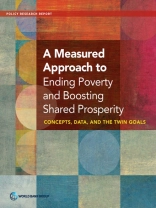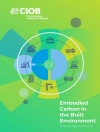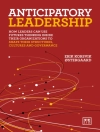In 2013, the World Bank Group adopted two new goals to guide its work: ending extreme poverty and boosting shared prosperity. More specifically, the goals are to reduce extreme poverty in the world to less than 3 percent by 2030, and to foster income growth of the bottom 40 percent of the population in each country. While poverty reduction has been a mainstay of the World Bank’s mission for decades, the Bank has now set a specific goal and timetable, and for the first time, the Bank has explicitly included a goal linked to ensuring that growth is shared by all.The discussion until now has centered primarily on articulating the new goals. This report, the latest in World Bank’s Policy Research Report series, goes beyond that and lays out their conceptual underpinnings, discusses their relative strengths and weaknesses by contrasting them with alternative indicators, and proposes empirical approaches and requirements to track progress towards the goals. The report makes clear that the challenges posed by the World Bank Group’s new stance extend not just to the pursuit of these goals but, indeed, to their very definition and empirical content. The report also argues that an improved data infrastructure, consisting of many elements including the collection of more and better survey data, is critical to ensure that progress towards these goals can be measured, and policies to help achieve them can be identified and prioritized.
World Bank
Measured Approach to Ending Poverty and Boosting Shared Prosperity [EPUB ebook]
Concepts, Data, and the Twin Goals
Measured Approach to Ending Poverty and Boosting Shared Prosperity [EPUB ebook]
Concepts, Data, and the Twin Goals
Buy this ebook and get 1 more FREE!
Language English ● Format EPUB ● ISBN 9781464803628 ● Publisher The World Bank ● Published 2014 ● Downloadable 3 times ● Currency EUR ● ID 5894665 ● Copy protection Adobe DRM
Requires a DRM capable ebook reader












